Every four years, thousands of athletes from across the globe come together to compete in the Olympic Games. While some will become household names, the majority don’t reach the kind of fame that sets them up monetarily for life — in fact, a significant number struggle just to keep up with the costs of competing.
According to 2024 reporting by Al Jazeera, “more than a quarter of all US Olympians report making less than $15,000 annually in total income.” Meanwhile, the out-of-pocket expenses are numerous, including training, traveling for competitions, medical care, and everything else under the sun that helps these elite athletes stay elite athletes. Though total expenses vary greatly by sport and by individual, they can add up to thousands of dollars a year. Women athletes are especially burdened by the costs, thanks to the gender pay gap, and to top it off, women’s sports receive only 1% of the $66 billion global sports sponsorship market.
Training to be an Olympian is a full-time job but with no benefits, no paid time off and, of course, no salary. And while Team USA gives out nearly $2.5 million annually to athletes in the form of various performance grants and rewards, the organisation is entirely privately funded: The U.S. is one of the very few countries that doesn’t provide federal funding to their Olympic athletes.
Below, we spoke with five anonymous Olympians, past and present, across different sports — track and field, swimming, and others — about the real price of going for gold, and whether it’s all worth it.
Editors’ Note: Interviews have been edited and condensed for clarity. All amounts are listed in US dollars, unless otherwise stated.
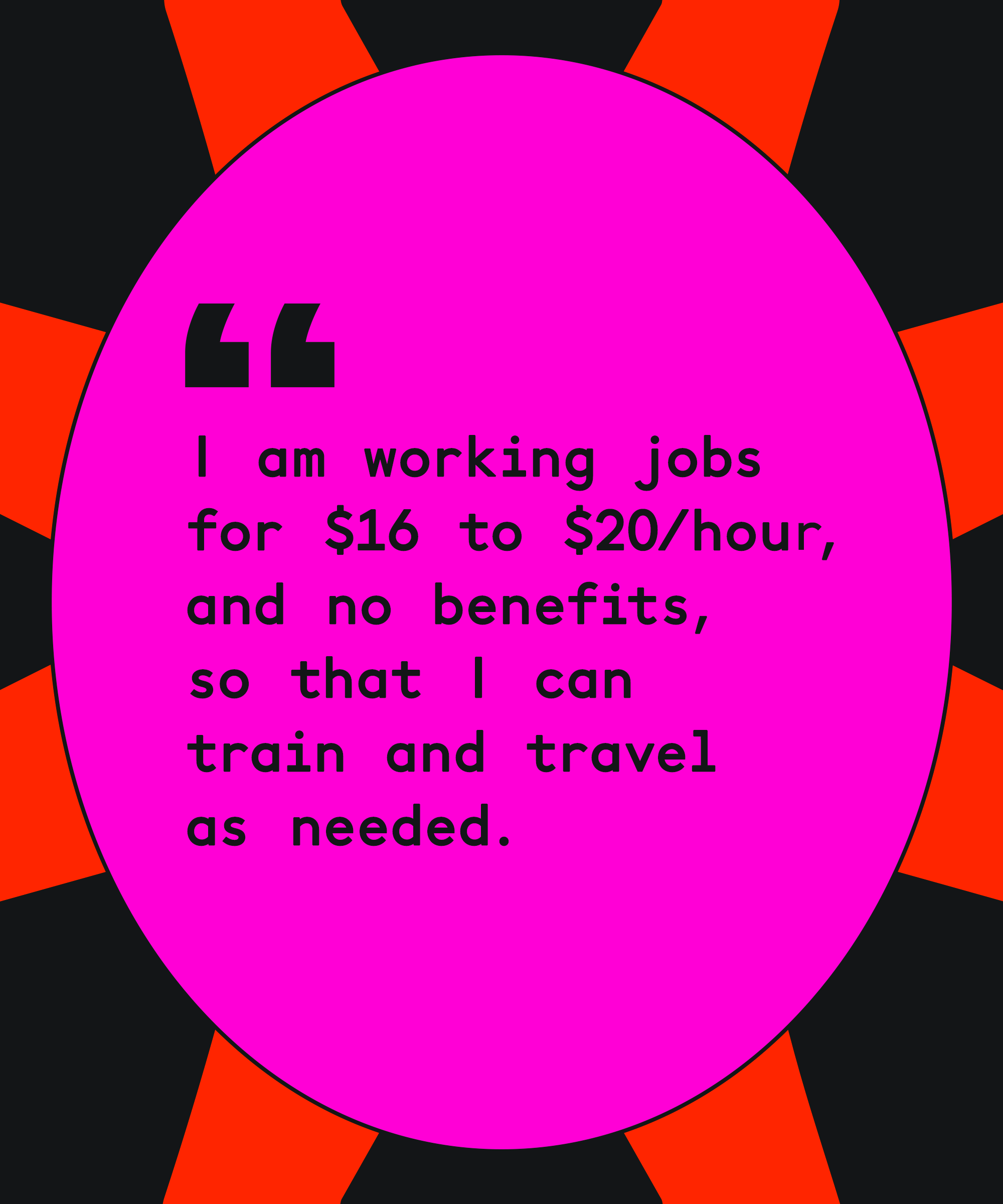
Location: US
Pronouns: She/her
# of Olympics attended: Paris will be the first!
Do you/have you worked while training, and have you ever received a stipend or sponsorship money? I have had a job for the entirety of my training. I coach several different teams and athletes, so with all my jobs I probably earn about $500 a month. I received travel stipends from sponsors in 2019, about $3,000 a year. I then had shoulder surgery and wasn’t receiving any money from sponsors until after I qualified for the Olympics. Now, I earn $5,000 a year from one sponsor. It wasn’t until after receiving that additional income that I was able to stop relying on my parents.
Describe your current money situation. I make enough to cover basic necessities — food, rent, gas mostly. Many training expenses are covered by my sponsors or my NGB [national governing body]. If I was making more money, there are some things I would get that I can’t currently afford, mainly certain food or more food.
How much have you spent to prepare for the Olympics? Luckily for me, many of my training expenses are covered. The biggest one for me would be equipment. [In my sport] we need new shoes about every four weeks, but I receive my shoes completely free. Coaches, nutritionists, sports psychologists and physical therapists are also all covered by Team USA or my national governing body. Before qualifying for the Olympics, I spent $250 a month on coaching and facility access.
How much have you spent to get to competitions? For the past three years, [international] travel has been covered by my NGB. That covers most of the flight, lodging, breakfast, dinner and event entry fees. If a flight is extremely expensive, the NGB sometimes won’t cover all of it, and I have to pay the remainder. Also not covered are visa fees and an international phone plan. For national events, usually nothing is covered.
What kind of money have you missed out on? I graduated summa cum laude with a BS in exercise science and could probably be doing well for myself in a career if that was the path I [had chosen]. Instead, I am working jobs for $16 to $20/hour, and no benefits, so that I can train and travel as needed.
Has it been worth the costs? I plan to pursue the 2028 Olympics, but that means I will be almost 30 without having started a retirement fund. Another hidden cost is health insurance. I have one year left of my parents’, but after that I will need to figure something out. I do have Elite Athlete Health Insurance through Team USA, but it doesn’t cover vision or dental, and I will no longer be eligible if I don’t achieve certain rankings. Even with all that, though, it is definitely worth it to me.
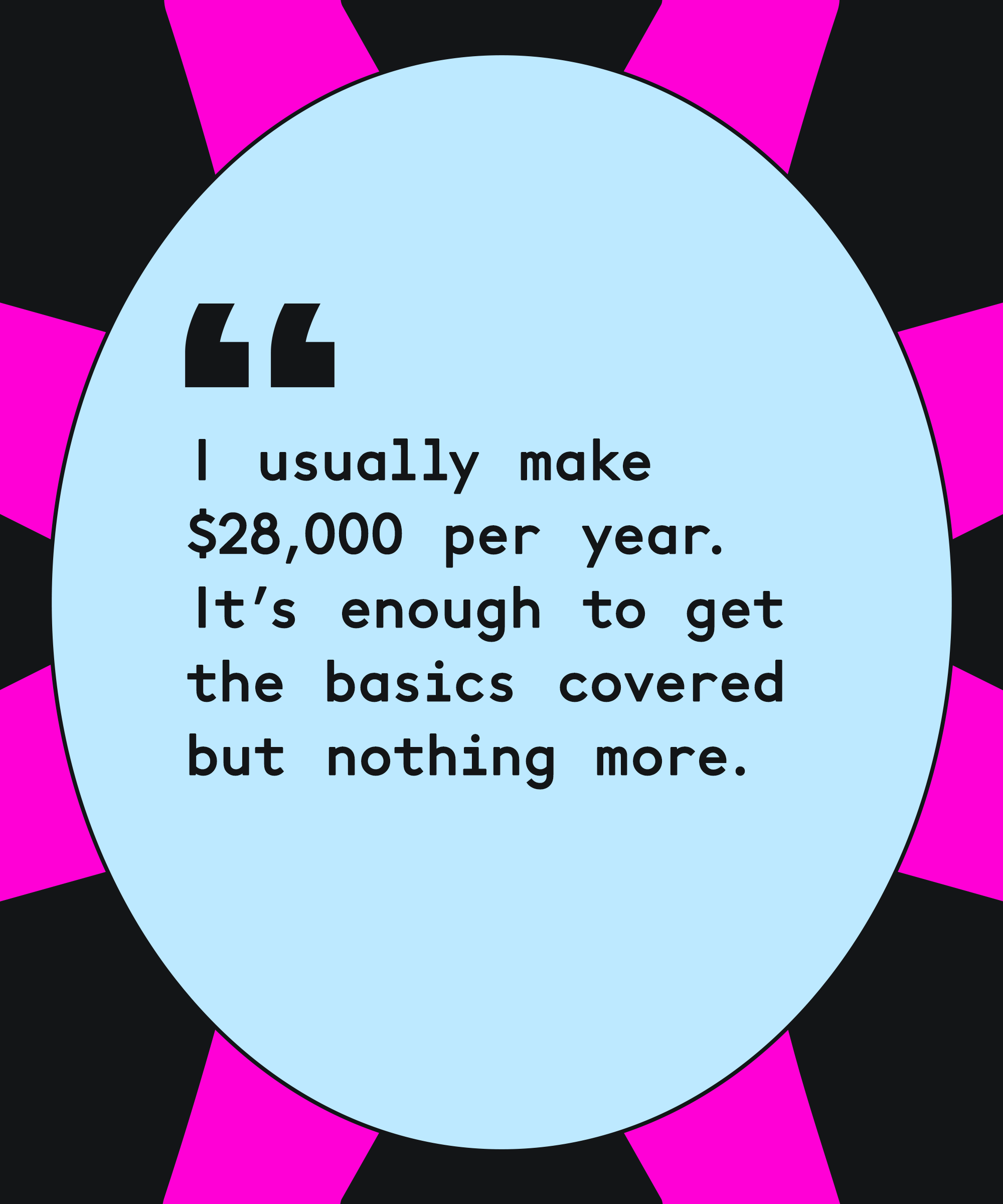
Location: Canada
Pronouns: She/her
# of Olympics attended: 2
Dollar figures for this Olympian noted in CAD.
Do you/have you worked while training, and have you ever received a stipend or sponsorship money? I haven’t had a job in the past four years. [But in my 20s] I had a few part-time jobs (cashier, waiter, et cetera), making roughly $15,000 per year. I’ve received a $10,000 stipend. Athletes have such unstable income sources that receiving sponsorship can be a godsend. I try to apply for a bursary or sponsorship that I’m eligible for. Some years I’m lucky, others not so much.
Describe your current money situation. [I make money through] carding and one sponsorship. In Canada, we have the Athlete Assistance Program, also known as carding. As a high-tiered athlete, I receive $1,725 a month. With my provincial top-up bonus, I usually make $28,000 per year. It’s enough to get the basics covered but nothing more.
How much have you spent to prepare for the Olympics? I pay $450 a month to get strength and conditioning training from my coach. This includes nutrition services, some rehab and physiotherapy services, and monitoring. I also see a physio and massage therapist twice a week. They charge $200 an hour, but thankfully I get this covered by an insurance plan for athletes.
How much have you spent to get to competitions? Last season I spent $10,000 on equipment and a further $9,200 in team fees. Team fees have gone up in the past two years, [while] Canada’s OTP [Own the Podium] funding has been reduced every year since the Beijing Olympics. These fees usually cover everything except food on travel days. We’re on our own to cover that as well. I average about 80 to 90 days away from Canada to compete.
What kind of money have you missed out on? I can’t get a full-time job due to the inconsistent nature of our sport. We train during business hours and are gone for periods of time, mostly to Europe.
Has it been worth the costs? As soon as you seek to reach a high level, it will cost more. Whether it’s better food, more specialised treatments, training camps… Yes, it has been worth it in the pursuit of my dream of being an Olympic medalist, but I wish we were better financially supported.
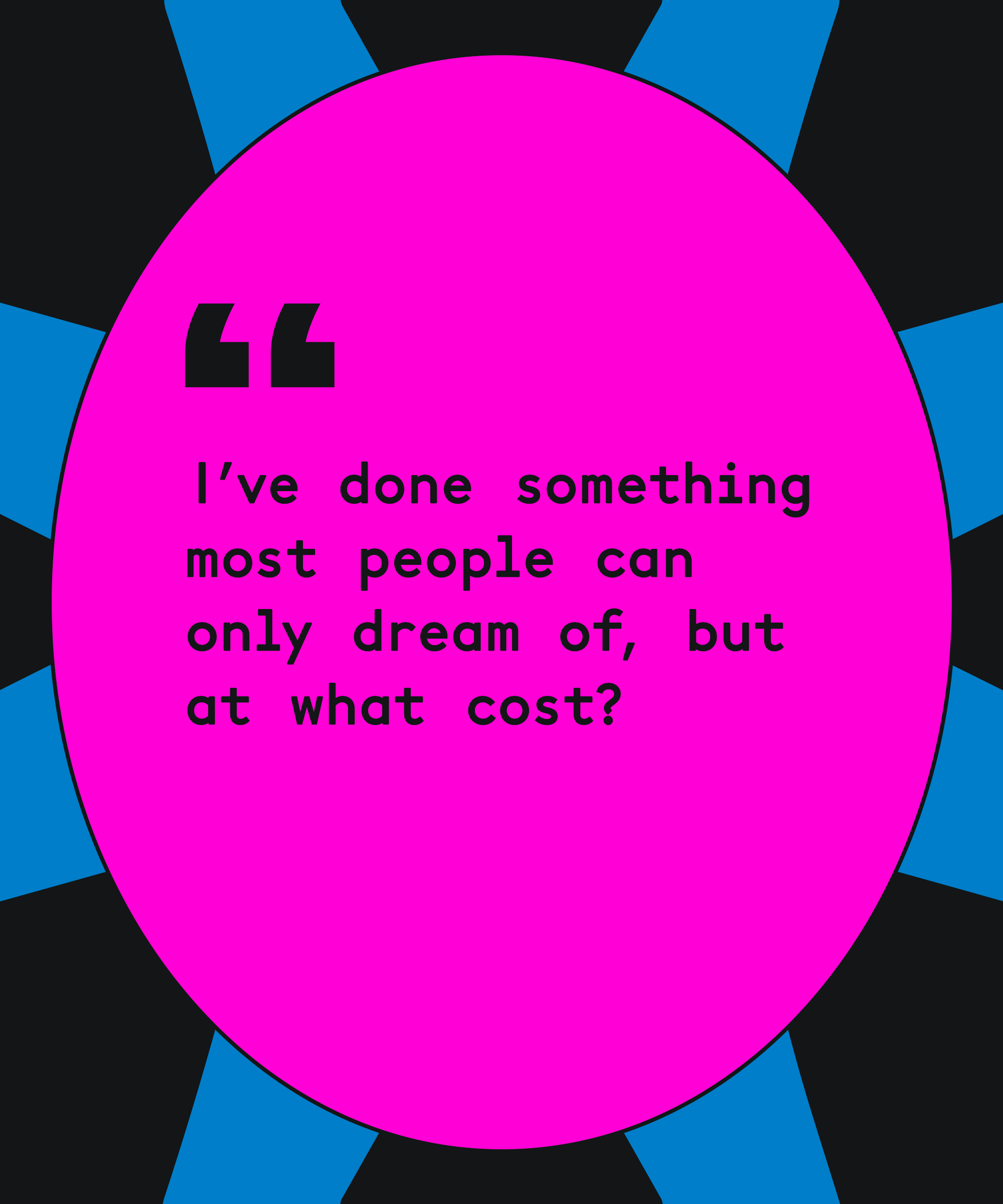
Location: US
Pronouns: she/her
# of Olympics attended: 1
Do you/have you worked while training, and have you ever received a stipend or sponsorship money? I had multiple jobs. I was coaching, refereeing, doing modelling jobs and social media. But it wasn’t a significant amount. I maybe earned $20,000 or $25,000. I was receiving $900 from a sponsor for a couple of years. Otherwise, I had a sponsor that would give me free equipment but no compensation. Finding sponsorships is very difficult because I’m in a niche sport. It was really disheartening watching athletes in more popular sports receiving sponsorships while I was struggling to make ends meet.
Have you gotten any athlete-related grant funding? A monthly salary of $300. During the pandemic, I also received a grant of $4,700.
Describe your current money situation. I referee and I do social media. My financial situation isn’t great. I have been applying for jobs but not only is the job market awful, I also don’t have the experience that everyone else around me has. I dedicated most of my life to my sport rather than finding internships. I never knew how important that was, and in hindsight I would have done things differently. However, it’s hard to say if that route would have gotten me to the Olympics.
How much have you spent to prepare for the Olympics? I was fortunate enough that my coach didn’t charge me because he knew I wouldn’t be able to afford it. I just had to help out at the club in exchange, and my name was used to market camps and club tournaments. I had a friend and a family friend who were my personal trainers, and a close friend connected me with their friend who is a sports psychologist.
How much have you spent to get to competitions? Around $14,000 to $16,000 a year. Sometimes a trip is more expensive depending on the time of year.
Has it been worth the costs? Looking back, I’m not quite sure. I’ve done something most people can only dream of, but at what cost? It’s been impossible to find a job due to lack of experience. And once you retire [from competition], it’s really hard to find something you’re passionate about. You lose your identity and sense of purpose. No one prepares you for that.
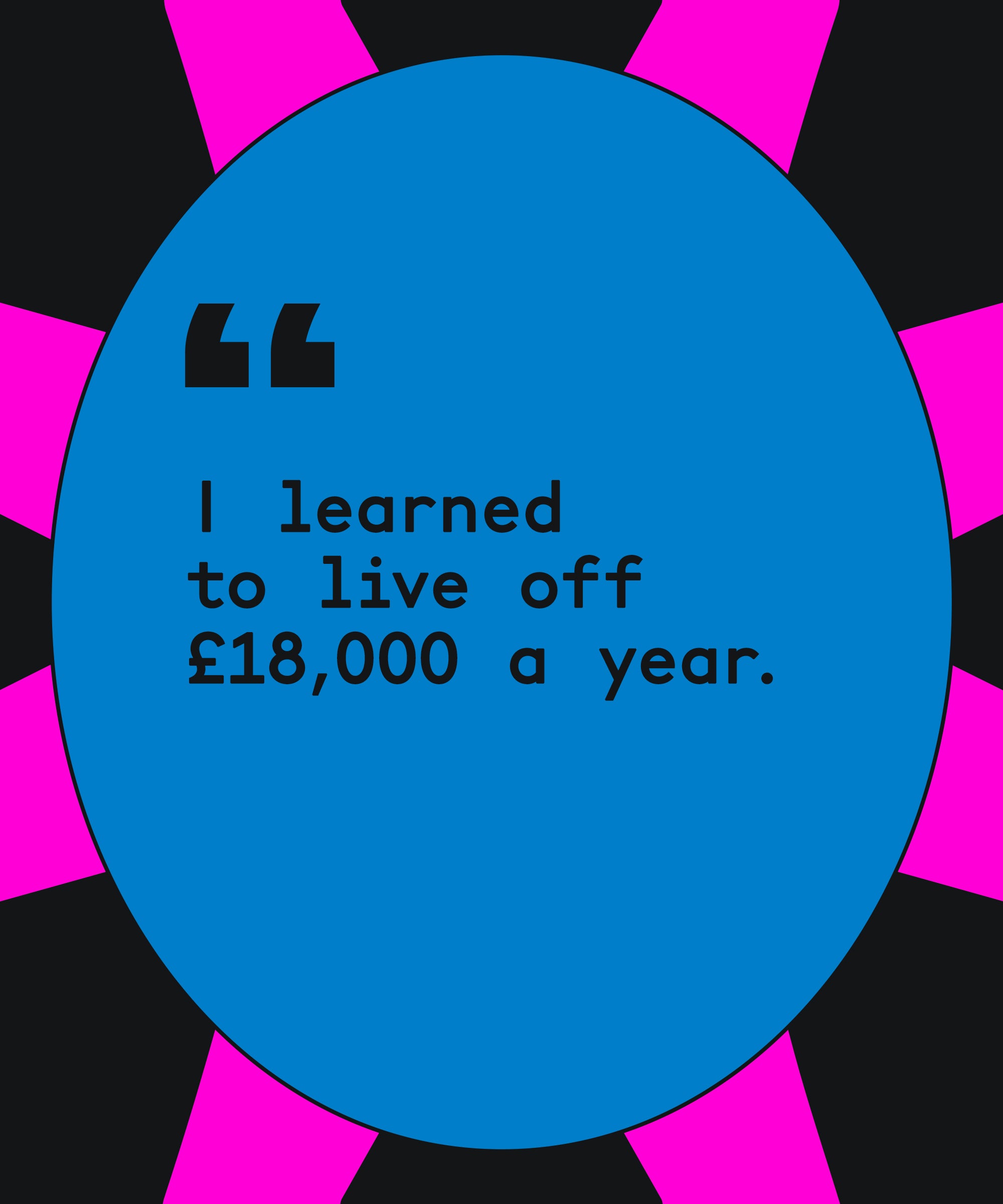
Location: UK
Pronouns: She/her
# of Olympics attended: 1
Do you/have you worked while training, and have you ever received a stipend or sponsorship money? Yes, shift work. It was a zero-hours contract, but it averaged out to £24,000 a year. I was lucky enough for periods of my career to have centralised funding, which makes a huge difference, though still doesn’t make things financially secure. I learned to live off £18,000 a year. If it wasn’t for the support of my family, that would have never been possible!
Describe your current money situation. Currently I work and train full time, which is less than ideal, but I also caused myself to get into a huge amount of debt while chasing my dream. I was, at one stage, in around £4,000 in debt by using credit cards to book my travel for competitions as I had no other means of paying. Financially, being an athlete is really difficult and puts a lot of strain on you and the people around you.
How much have you spent to prepare for the Olympics? I spend at least £14,000 a year on sport. Travel is probably the biggest expense, averaging often over £1,000 a month. Physio and treatment are around £100 a month in general, but that’s without an injury. Equipment can be over £100 a month. Specialist equipment can be very expensive, but does not need replacing monthly. Coaches are often 10% to 15% of anything you earn. Agents can be 10% to 15%. Nutritional support can be up to £75 a session, or more if you want prolonged interaction. Warm-weather training camps, which are a massive part of the preparation for the season, can cost upwards of £1,500.
How much have you spent to get to competitions? For a UK-based competition, on average, it probably ends up costing around £500 to £600. In the summer, this is every other weekend normally, but can sometimes be more. If I compete abroad, it’s the cost of airport parking, fuel to the airport, taxis and occasionally hotels and flights if the competition isn’t covering.
What kind of money have you missed out on? Getting leave [vacation] and a job that understands is the hardest bit of my sport. I have missed out on numerous financial opportunities due to competition and training.
Has it been worth the costs? I would never not chase my dream due to money, but it certainly makes things significantly harder when you don’t have the support of sponsors or the funding system.
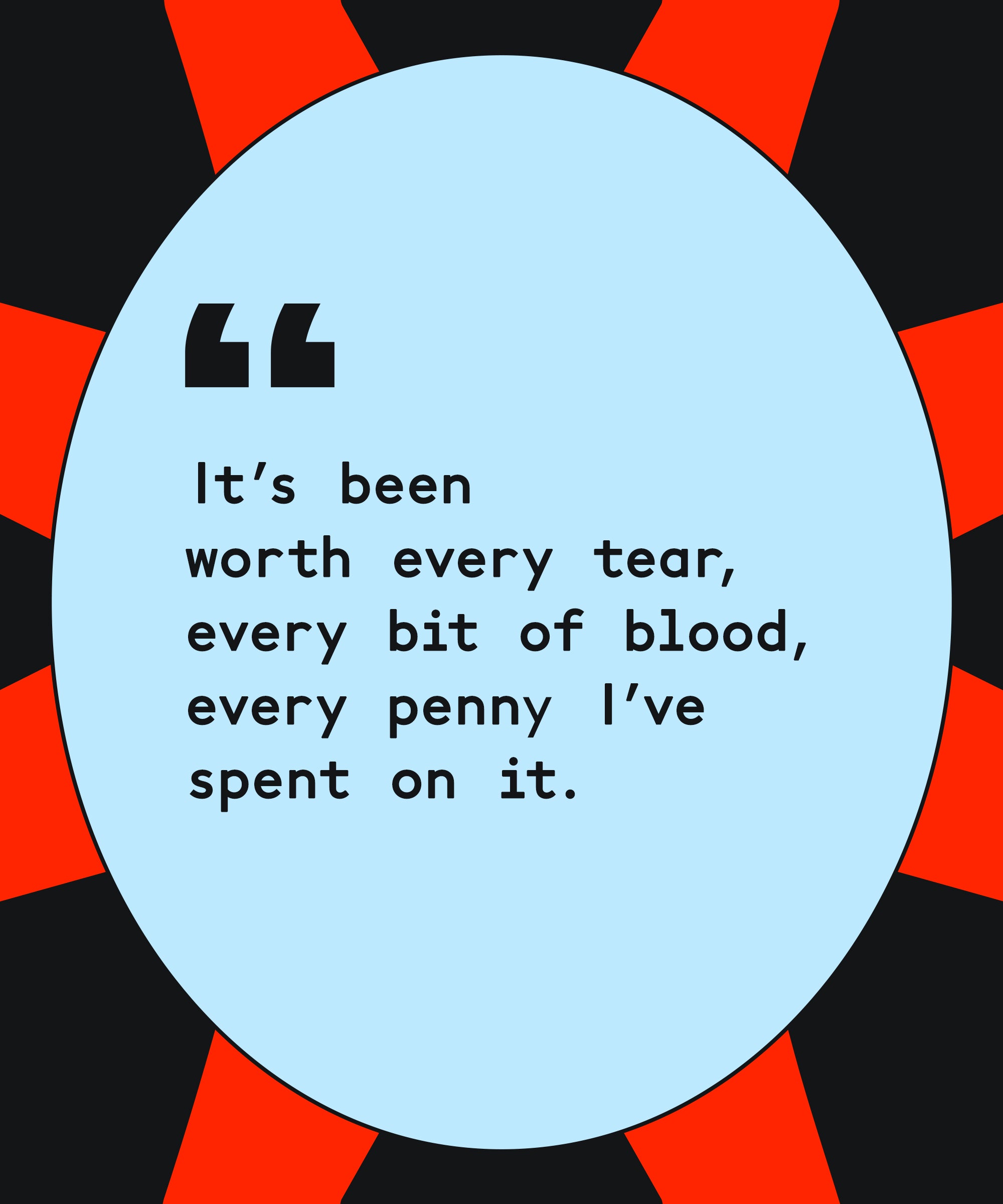
Location: UK
Pronouns: She/her
# of Olympics attended: 1
Do you/have you worked while training, and have you ever received a stipend or sponsorship money? I’ve never had a job while training. I relied on UK Sport funding for a very long time, and then have been very fortunate to get some really cool sponsorship opportunities, so I was able to sustain myself once I finished my education. The student maintenance loan at one point was really important for me — it was about £3,000 or £3,500 a year. [Sponsorships have] been my main source of income since about 2021. Combined, the sponsorship money has totalled about £80,000 to £100,000 a year since 2021. I’m including in this any commercial opportunities, like being a brand ambassador.
Have you gotten any athlete-related grant funding? [As part of the UK Sport Athlete Performance Award], I was receiving £7,000 a year when I was 16, 17, and 18. Then at age 19, it went up to I believe £15,000 a year until I was 23. Since then, I haven’t received any UK Sport funding. One year I was taken off this funding and had to go back to relying on my mom. Losing that money did make me question, Should I keep doing my sport? Thankfully I did.
Describe your current money situation. It’s good. I still have my sponsorship and commercial opportunities, and I’m working on building opportunities for myself within my sport. I think I’ve been quite sensible with the money I have received. I’ve been trying to invest it correctly, not buying anything too flashy or expensive.
How much have you spent to prepare for the Olympics? I’m quite fortunate that my sport is a big sport. It has a lot of help where, especially when you’re on that UK Sport program, you get access to a nutritionist and physiotherapists, so a lot of it you don’t have to spend your own money on. But training camps I would try to avoid, especially when I didn’t have my sponsorship money, because they’re expensive.
What kind of money have you missed out on? There have been quite a few opportunities, whether modelling or brand ambassador opportunities, that I have had to say no to because of training. It’s one of those things I’m always kind of annoyed by, but I’m well aware I wouldn’t have had these opportunities without my sport.
Has it been worth the costs? I’m fortunate to say I’m an Olympian because there are so many people who spend so much time and money and don’t get to call themselves an Olympian. It’s a mental and physical toll. I’ve been very fortunate that I’ve built a very beautiful community around me, which has helped me financially, mentally, and physically in so many ways. It’s been worth every tear, every bit of blood, every penny I’ve spent on it.
Like what you see? How about some more R29 goodness, right here?
Jordan Chiles Wouldn’t Change A Thing